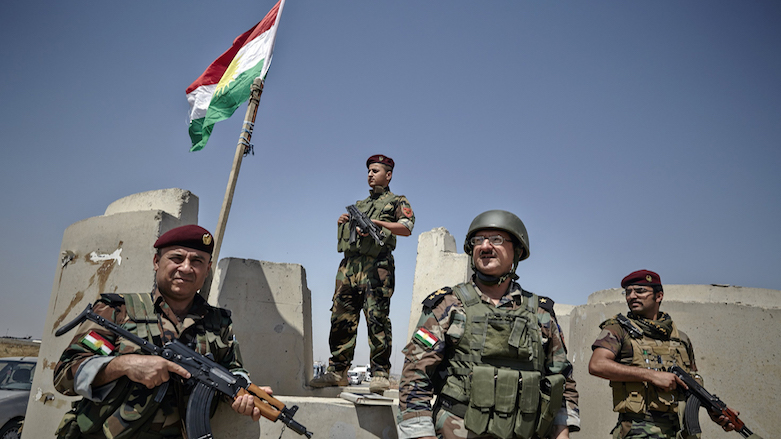Security ties between Peshmerga, Iraqi forces renewed

WASHINGTON DC, United States (Kurdistan 24) – With the reemergence of the Islamic State (IS) and security deteriorating in the disputed territories, cooperation between the Kurdish Peshmerga and Iraqi Security Forces (ISF) is being renewed.
The US-led Coalition (CJTF-OIR) is urging the formation of a Joint Task Force between the Peshmerga and Iraqi forces, an informed Kurdish source told Kurdistan 24, corroborating recent reports in the Kurdish and Iraqi press.
The animosity associated with Baghdad’s attack on Kirkuk last October appears to be giving way to a pragmatic recognition that cooperation is necessary to prevent a common foe from returning.
BuzzFeed carried a major report on Sunday, noting “a group of [IS] veterans” is forming in the Hamrin mountains, “readying itself to terrorize the country once more.”
“They are [IS], but they gave themselves a new name,” Maj. Gen. Rasul Omar Latif, a Peshmerga commander in Sulaimani, explained to BuzzFeed.
Similarly, the Mayor of Makhmour told Kurdistan 24 on Monday that IS militants are increasing their activities in the area (Makhmour had been under Peshmerga control until October when Iraqi federal forces took the town).
Meetings on security cooperation, with US officers in attendance, have been held between the Peshmerga and ISF, this source confirmed.
Maj. Gen. Walter Piatt, the newly appointed Commander of Coalition ground forces (known by the acronym, CJFLCC-OIR), led a high-level delegation to Erbil last week.
According to a Kurdistan Regional Government (KRG) summary of Piatt’s meeting with Prime Minister Nechirvan Barzani, also attended by Deputy Prime Minister Qubad Talabani, Barzani expressed the KRG’s “readiness to cooperate and coordinate” with the Coalition, especially “where the threat of terrorism remains.”
The Prime Minister also “stressed the need for an effective mechanism between the KRG and the Iraqi federal government.”
Similarly, Chancellor of the Kurdistan Region Security Council Masrour Barzani expressed to Piatt his “concern about instability in Iraq as well as Kurdistani territories outside of the Kurdistan Region.”
He also “stressed the need for cooperation” between the Kurdistan Region and its Iraqi counterparts, as well as with “international partners to restore stability” and address the “political, economic, and administrative” failures that lead to extremism and violence.
Contacted by Kurdistan 24, Col. Ryan Dillon, Spokesperson for CJTF-OIR, affirmed via e-mail, “Continued pressure from security forces—both ISF and Peshmerga—is necessary to prevent an [IS] resurgence.”
“Iraqi security forces and Peshmerga have proven they can overwhelm [IS] when they cooperate together and share information,” Dillon stated, although he declined to confirm press reports suggesting the US was promoting renewed security coordination between the two.
Still, a week before Piatt visited Erbil, Mazahim al-Howeit, a Spokesperson for the Arab tribes in Nineveh, said a “US delegation will visit Baghdad and Erbil next week to discuss redeploying Peshmerga troops, along with federal forces,” Iraqi News reported, citing Radio Sawa, a US-funded broadcaster.
The Peshmerga had “preserved security in those regions,” but after the Peshmerga withdrew, “crimes were carried out against civilians,” Howeit said.
He explained that “representatives of the Arab tribes [had] met with officials from the Departments of State and Defense to tackle the situation” in those areas.
On March 27, the day before Piatt traveled to the Kurdistan Region, Iraqi Prime Minister Haider al-Abadi acknowledged that the conflict with Erbil had created a security vacuum which IS extremists had exploited.
“We are creating security cells under the leadership of the federal government’s Counter Terrorism Forces with the participation of security forces from the Kurdistan Region to fill the security vacuum,” the Iraqi Prime Minister explained.
Editing by Karzan Sulaivany
